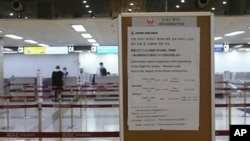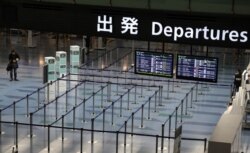After months of cooling tensions, Japan and South Korea may be on the verge of another row, this time, over the COVID-19 coronavirus outbreak.
South Korea sent out a foreboding omen Friday after Japan said it would quarantine travelers from South Korea or China. South Korea's National Security Council called the decision “unreasonable, excessive and extremely regrettable,” adding it would consider reciprocal measures.
South Korea now has the second-largest outbreak in the world, with at least 6,767 confirmed cases of COVID-19 and 45 deaths as of mid-afternoon Saturday. Meanwhile, Japan has more than 1,000 cases between its mainland and the Princess Diamond cruise ship. The nations, however, have taken different approaches in handling their outbreaks — South Korea has tested its citizens for COVID-19 aggressively compared to Japan, using thousands of kits more per day.
In Japan, chief government spokesman Yoshihide Suga called the travel curbs decision “result of a comprehensive review of the information available about the situation in other countries and the effects of other measures.”
Although several other nations have banned the entry of South Korean travelers, Japan’s move likely hit a nerve with Seoul because of already-existing, unresolved conflicts between the two countries.
A dispute broke out between the two countries last year after Tokyo restricted exports of three products used in South Korean electronics on national security grounds. Many in South Korea saw the export restrictions as retaliation for a South Korean Supreme Court order that a Japanese company compensate living Korean victims of forced labor during Japan's World War II occupation of the Korean peninsula, and boycotted Japanese products.
"I think we have to see this in context of very poor bilateral relations between the two countries,” said Peter Ward, a researcher on the North Korean economy. “The imposition of trade sanctions, the boycott in South Korea, the forced labor disputes … It has to be seen in that context.”
Although the boycotts have died down, Japan’s decision to quarantine South Korean travelers may be provoking old strife.
"Put it this way: If another country that was not Japan had outlined such measures, I’m not sure that South Korea would have been so quick to respond the way they have,” Ward said.
"It is regrettable that a public health threat that knows no borders is complicated by nationalist politics,” said Leif Eric-Easley, an associate professor of international studies at Ewha Womans University in Seoul.
Ultimately, he said, “the need and opportunities for cooperation regarding COVID-19 should outweigh the points of friction.”





